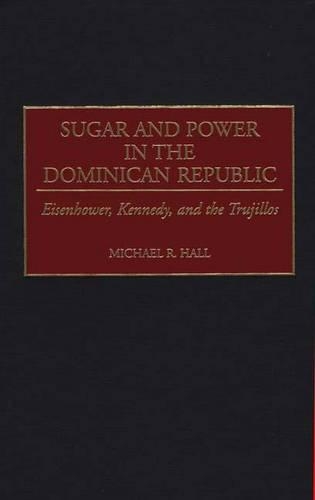
Sugar and Power in the Dominican Republic: Eisenhower, Kennedy, and the Trujillos
(Hardback)
Publishing Details
Sugar and Power in the Dominican Republic: Eisenhower, Kennedy, and the Trujillos
By (Author) Michael R. Hall
Bloomsbury Publishing PLC
Praeger Publishers Inc
30th January 2000
United States
Classifications
Tertiary Education
Non Fiction
Economic history
History of the Americas
Manufacturing industries
International trade and commerce
327.7307293
Physical Properties
Hardback
176
Width 156mm, Height 235mm
369g
Description
A study of the powerful impact that sugar had on U.S.-Dominican relations as the primary vehicle of reciprocal manipulation from 1958 to 1962, Sugar and Power examines the development of the sugar industry in the Dominican Republic. Hall uncovers new evidence that supports the belief that U.S.-Latin American relations during this period were frequently a two-way street, with the United States reacting to Latin American initiatives just as frequently as Latin Americans responded to American initiatives. Both Eisenhower and Kennedy used sugar quota legislation as a foreign policy tool. At the same time, the Trujillo regime played upon Washington's fear of communism in response to the Cuban revolution to obtain an expanded sugar quota. Drawing heavily on U.S. and Dominican government documents, this study argues that the U.S. initiated economic sanctions against Trujillo to gain hemispheric support against Castro's Cuban revolution. Kennedy expanded those sanctions in an attempt to push the Dominican Republic along the path toward democracy. Although Juan Bosch's election at the end of 1962 and the allotment of a generous sugar quota indicated the apparent success of U.S. foreign policy toward the Dominican Republic, the overthrow of Bosch in 1963 indicated that the path toward democracy was longer than American policy makers had anticipated. This case study in the role of economic coercion in U.S.-Latin American relations during the Cold War tries to present a balanced account of both sides of the story.
Reviews
"Hall clearly and succinctly analyzes an important binational relationship..."-Choice
[p]rovides a thorough, well-researched treatment of an important moment in Dominican history and of the role that aggressive U.S. foreign policy briefly played in forging (stillborn) democracy in the Dominican Republic.-The Historian
[r]eaders should be pleased with the quality of Hall's research and his forceful presentation. readers will also discover Eisenhower's and Kennedy's role in policymaking at the expense of the dealing with Trujillo. In sum, this is a valuable addition to our understanding of United States- Caribbean relations.-Journal of Third World Studies
"provides a thorough, well-researched treatment of an important moment in Dominican history and of the role that aggressive U.S. foreign policy briefly played in forging (stillborn) democracy in the Dominican Republic."-The Historian
"readers should be pleased with the quality of Hall's research and his forceful presentation. readers will also discover Eisenhower's and Kennedy's role in policymaking at the expense of the dealing with Trujillo. In sum, this is a valuable addition to our understanding of United States- Caribbean relations."-Journal of Third World Studies
""Hall clearly and succinctly analyzes an important binational relationship...""-Choice
"[p]rovides a thorough, well-researched treatment of an important moment in Dominican history and of the role that aggressive U.S. foreign policy briefly played in forging (stillborn) democracy in the Dominican Republic."-The Historian
"[r]eaders should be pleased with the quality of Hall's research and his forceful presentation. readers will also discover Eisenhower's and Kennedy's role in policymaking at the expense of the dealing with Trujillo. In sum, this is a valuable addition to our understanding of United States- Caribbean relations."-Journal of Third World Studies
Author Bio
MICHAEL R. HALL teaches Latin American and Diplomatic History at Armstrong Atlantic State University in Savannah, Georgia./e He served in the Peace Corps in the Dominican Republic from 1984 to 1987.
